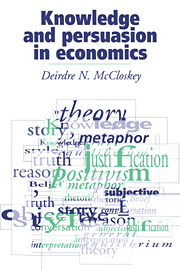Book contents
- Frontmatter
- Contents
- List of figures and tables
- Preface
- Acknowledgments
- Part I Exordium
- Part II Narration
- Part III Division
- Part IV Proof
- Part V Refutation
- 14 The very idea of epistemology
- 15 The tu quoque argument and the claims of rationalism
- 16 Armchair philosophy of economics
- 17 Philosophy of science without epistemology: the Popperians
- 18 Reactionary modernism: the Rosenberg
- 19 Methodologists of economics, big M and small
- 20 Getting “rhetoric”: Mark Blaug and the Eleatic Stranger
- 21 Anti-post-pre-metamodernism: the Coats/McPherson/Friedman
- 22 Splenetic rationalism, Austrian style
- 23 The economists of ideology: Heilbroner, Rossetti, and Mirowski
- 24 Rhetoric as morally radical
- Part VI Peroration
- List of works cited
- Index
17 - Philosophy of science without epistemology: the Popperians
Published online by Cambridge University Press: 01 February 2010
- Frontmatter
- Contents
- List of figures and tables
- Preface
- Acknowledgments
- Part I Exordium
- Part II Narration
- Part III Division
- Part IV Proof
- Part V Refutation
- 14 The very idea of epistemology
- 15 The tu quoque argument and the claims of rationalism
- 16 Armchair philosophy of economics
- 17 Philosophy of science without epistemology: the Popperians
- 18 Reactionary modernism: the Rosenberg
- 19 Methodologists of economics, big M and small
- 20 Getting “rhetoric”: Mark Blaug and the Eleatic Stranger
- 21 Anti-post-pre-metamodernism: the Coats/McPherson/Friedman
- 22 Splenetic rationalism, Austrian style
- 23 The economists of ideology: Heilbroner, Rossetti, and Mirowski
- 24 Rhetoric as morally radical
- Part VI Peroration
- List of works cited
- Index
Summary
If the philosophy of economics fails to persuade empirically, is it at least persuasive as modern philosophy? I can only judge from the outside in a rough and statistical way, since I am able to judge the arguments themselves only in the rare cases in which I as a non-philosopher have thought about them. But the data suggest that philosophy of economics ignores the conversation of philosophers, too, in favor of a tiny group of specialists in a safely narrow field, the school descended from Popper (though of course amending the master in this or that detail). The philosophers of economics favor a particular school in the philosophy of science; and the particular school in philosophy of science does not keep up with epistemology generally. It would be as though rhetoricians of economics did not read Wayne Booth or Stanley Fish, not to speak of Aristotle on rhetoric. Or as if historical economists did not read economics or history, but merely their fellow historical economists.
The data is again bibliographical, though a reading of the texts of the philosophers of science gives the same impression, if in a less (I am embarrassed to use the word) objective form. Daniel Hausman, for example, wrote a long “Introduction” to his anthology, The Philosophy of Economics (1984) and a long “Appendix: An Introduction to the Philosophy of Science” for his The Inexact and Separate Science of Economics (1992), about a hundred pages altogether.
- Type
- Chapter
- Information
- Knowledge and Persuasion in Economics , pp. 236 - 246Publisher: Cambridge University PressPrint publication year: 1994



